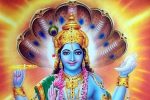NAME 67
Jyeṣṭhaḥ ज्येष्ठः
Jyeṣṭha means pre-eminence, first, etc. This nāma says that Viṣṇu is the first in the universe. He created Himself on His own. Nobody created Him and every other thing originated from Him.
Chāndogya Upniṣad explains this nāma in relation to the previous two nāma-s. The Upniṣad (V.i.1) says:
यो ह वै ज्येष्ठं च श्रेष्ठं च वेद ज्येष्ठश्च ह वै श्रेष्ठश्च भवति प्राणो वाव ज्येष्ठश्च श्रेष्ठश्च॥
yo ha vai jyeṣṭhaṁ ca śreṣṭhaṁ ca veda jyeṣṭhaśca ha vai śreṣṭhaśca bhavati prāṇo vāva jyeṣṭhaśca śreṣṭhaśca ||
The meaning is – He who knows the oldest and the best, becomes the oldest and the best. When one knows the Self, he becomes That. It is prāṇa, which is the oldest and the best.
The previous two nāma-s explained the importance of prāṇa and this nāma says that prāṇa is not only ancient but also the best in terms of life sustenance. This nāma subtly conveys that prāṇa is the earliest creation of the Brahman.
Jyeshttah – The Eldest of all.
Literally this Nama means ‘older than the oldest’. Vriddha means an old person. Brahma is called Vrddha-Tara since he is older than all the other beings as he Created all others as a result of this function being entrusted to Him by Bhagavan. Bhagavan is Vrddha-tama because He Created Brahma, and thus is older than Brahma.
Swami ChinmayAnanda points out that Jyeshttah is a superlative term for the word ‘Vrddha’ (Vrddha – aged; Jyayan – more aged; Jyeshttah – most aged) and means the oldest.
In Adi Sankara’s words Bhagavan is ‘Vriddhatamo Jyeshttah’ – Older than the oldest.
६७. ॐ ज्येष्ठाय नमः |
67. OM Jyeṣṭhāya Namaḥ
(67) Jyeshthah -Older than all. The Infinite is That which was even before the very concept of space (Aakaasa) came into existence. The term is the superlative degree of the Aged. In short, the import of this term is the same as the more familiar term used in our sastras, the Ancient (Sanaatanah).
Vr̥ddhatamaḥ; Atiśayena vr̥ddhaḥ The oldest; for there is nothing before him.
Br̥hadāraṇyakopaniṣat – Chapter 8, Section 1
Oṃ yo havai jyeṣṭhaṃ ca śreṣṭhaṃ ca veda jyeṣṭhaśca śreṣṭhaśca svānāṃ bhavati; prāṇo vai jyeṣṭhaśca śreṣṭhaśca; jyeṣṭhaśca śreṣṭhaśca svānāṃ bhavati, Api ca yeṣāṃ r̥bhūṣati ya evaṃ veda. (1)
He who knows that which is the oldest and greatest, becomes the oldest and greatest amongst his relatives. The vital force is indeed the oldest and greatest. He who knows it to be such – becomes the oldest and greatest amongst his relatives as well as amongst those of whom he wants to be such.
INTERPRETATION GUIDED BY SANT VANI (WORDS OF SAINTS)
Jyeṣṭhaḥ
The eldest.
Here the superlative is used. He is jyeṣṭha, vṛddhatama, that is, the oldest. How? Sarvasya kāraṇatvāt – because He is the cause of everything. As prāṇa, that is, Hiraṇyagarbha, He is the eldest and there cannot be anything older than Him, because He is the cause of all. Hence, He is older than everything else.
The eldest one, He who is old. He is the oldest of all beings.
He, who is the most praiseworthy and deserving of all praise.
In the Sabhā Parva of the Mahabharata when it is time to decide who must be the guest of honor during the Rajasuya Yagna (यज्ञः), all the assembled members discuss and deliberate about who is the oldest, the most deserving and so on. It is left to Sahadeva to point out to them how they are missing the woods for the trees:
He says, “Why are you all deliberating so much about what should be obvious to everyone? Here stands Acyuta (अच्युत,) who is the Supreme Being himself. He is the sacrifice, the sacrificer, and the object of the sacrifice. This entire Universe functions because of him. He is the oldest person here in this hall, elder to everyone else and therefore he alone deserves the pride of place here.”
The use of the name Acyuta (अच्युत,) is significant. Acyuta is he who is unwavering and infallible and clear-headed.” In fact the first name that Arjuna uses for Kṛṣṇa in the Bhagavad-gītā is Acyuta when he asks Kṛṣṇa to place his chariot in the center of kurukṣétra between the two armies – Arjuna’s mind is already wavering and unsteady and he leans on his infallible, unwavering, clear-headed companion Kṛṣṇa whom he addresses as Acyuta.
Devi Parvati also addresses Maha Viṣhṇu as her elder brother – Jyeshtha.
Connecting this name to the previous names in the string we see that the The inner-controller (Īśānaḥ), who bestows on us the gift of Prāṇa (Prāṇada) and is seated within as the Prāṇa itself is also our closest companion – the elder brother literally, the Guru who can show us the light – that Jyeṣṭhaḥ who we have to hold on to to find ourselves and the true nature of our being.
There is the beautiful story of how the young boy Śaṅkara finds his Guru Govinda Bhagavatpāda in a cave near Narmada. As Śaṅkara comes to the banks of the Narmada he realizes intuitively that he would be able to find his Guru here. He asks around and then comes to Omkareshwara and to a guha (cave) which has a big rock placed at its opening with only a small hole allowing some light and air inside. The people and sages around that place tell Śaṅkara that inside that cave lives a very old sage who is in a state of Samādhi and almost never comes out of the cave.
Śaṅkara intuitively realizes that he has arrived at the doorstep of his Guru. He circumambulates the cave and prays to the Guru within. Some say that he composed the great Nirvana Ashtakam then but whatever he said changed that great being inside. It is said that the great sage Govinda Bhagavatpāda on hearing the sweet voice of that young Dravida Sisu Śaṅkara, stirred for the first time. A shiver ran down the body of that sage who for several years had been in deep Samādhi – unshakable like that ancient serpent Ādi Śeṣa and he thrust his feet out of the small opening in the cave and Śaṅkara held on to the feet of that Jyeṣṭhaḥ who then pulled his feet and the little boy into the cave of that eternal being…
Years later when Śaṅkara composed the Dwadasa Manjarika Stotram (more popularly known as the Bhaja Govindam) it was his Guru Govinda Bhagavatpāda that he was also referring to in addition to the Supreme being Govinda – indicating to us that the Guru and the Supreme being are inseparable in reality…
PLEASE WATCH
Śaraṇāgati (Sharanagati / शरणागति) to that in-dwelling Jyeṣṭhaḥ, holding onto him and listening to him when he speaks (and he does) is the first step and the most important one in the journey within.



